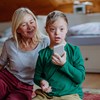buren
The Demography of Sweden's Transgender Population: A Research Note on Patterns, Changes, and Sociodemographics
Demography Abstract We examine the prevalence of gender transitions in Sweden over time and document the sociodemographic characteristics of people transitioning in different periods. Using administrati
Equity, Justice, Interdependence: Intergenerational Transfers and the Ageing Population
How the state can afford pension and healthcare costs for ageing populations, and who should carry the burden has become a central question. Thus far, focus has been on public transfers while neglecti
Where Would Ukrainian Refugees Go if They Could Go Anywhere?
International Migration Review Abstract We present estimates of the number of refugees expected to flee Ukraine and to which countries they are expected to migrate based on migration preferences data fr
Ethical Challenges in Using DALYs to Inform Health Interventions: Some Lessons from Population Ethics
Institute for Futures Studies. Working paper 2025:2 From the introduction The Global Burden of Disease Study (GBDS) is an international and interdisciplinary effort to quantify health losses from a wide
Workshop: Global Health Impact
Every year nine millionpeople are diagnosed with tuberculosis, every day over 13,400 people areinfected with AIDs, and every thirty seconds malaria kills a child. For most ofthe world, critical medica

The future of disabilities: The ethics and politics of disability and technology
This project will investigate how theories on equality and justice are affected by the fact that many disabilities are becoming a matter of choice as a consequence of the use of new technologies.
Women's experience of child death over the life course: A global demographic perspective
AbstractThe death of a child affects the well-being of parents and families worldwide but very little is known about the scale of this phenomenon. We provide the first global overview of parental bere
Global sex differences in hygiene norms and their relation to sex equality
Plos Gloal Public Health Abstract Strict norms about hygiene may sometimes have health benefits but may also be a burden. Based on research in the United States, it has been suggested that women traditi
Edward Page: Addressing future loss and damage associated with climate change
Edward Page, Associate Professor of Political Theory, University of Warwick ABSTRACTClimate change, by damaging the quality of life of populations already suffering from acute vulnerability and hardshi the adoption of measures of mitigation and adaptation and a ‘second-order injustice’ if the associated losses and damages arise as of these measures. Both forms of injustice involve ‘losses and damages’ arising that would not have occurred but for climate change but raise distinct normative problems given their diverging origins. This research seminar explores some key normative puzzles raised by the new ethics and politics of ‘loss and damage’ as it relates to both first-order and second-order climate change injustice. In particular, the lecture focuses on which normative principles should guide measures seeking to address first-order and second-order climate change injustices experienced by states and how (if at all) new forms of policy can be designed that respect these principles.
Climate ethics and future generations
Workshop within the research project "Climate ethics and future generations", 27–29 September. Audience members admitted by invitation only. 1st Day – 27th September 8:45 – 9:15 Coffee/Breakfast 9.1








